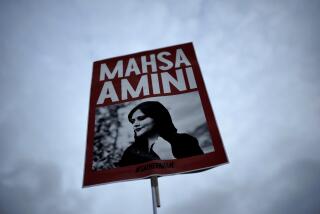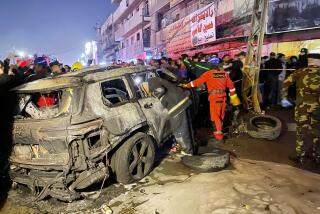Strike may have killed Al Qaeda trainer
A Pakistani security official said an apparent U.S. missile strike early Monday may have killed a senior Al Qaeda trainer believed to be a chemical weapons expert.
Local officials in the tribal region of South Waziristan said that at least 12 people died in the attack, believed to have been carried out by an unmanned aerial drone. Foreign militants were among the dead, and one of them was thought to be Abu Khabab Masri, the official said, speaking on condition of anonymity.
The Pakistani military, as is its custom, denied knowledge of the missile strike and whether it had been carried out by the United States. American attacks inside Pakistan are highly sensitive politically.
One U.S. official familiar with the incident said the Pentagon was not involved and that “it was an agency-run op all the way,” a reference to the CIA. The agency had no comment.
A U.S. counter-terrorism official in Washington said that Masri, whose given name is Midhat Mursi al-Sayid Umar, was believed dead. Both officials spoke on condition of anonymity.
“There is indeed a sense that he’s gone,” said the counter-terrorism official. “This guy not only had knowledge that was dangerous but did dangerous things with it,” added the official, who described Masri as a longtime Al Qaeda specialist in poisons and explosives.
The attack came on the day that Pakistani Prime Minister Yusaf Raza Gillani was meeting President Bush in Washington. In the past, Pakistani authorities have sometimes aided in or carried out the reported capture or killing of a senior Islamic militant at around the time of such meetings.
But another, senior American official said that, in this case, the strike was a “strictly unilateral” one by the U.S. without any assistance from Pakistan. It was merely coincidental that it overlapped with Gillani’s visit, the official said.
The Pakistani security official cautioned that the death of Masri had not been corroborated by DNA tests or any other means of positive identification. Masri’s death was reported once previously, in a January 2006 strike in the village of Damadola, in the Bajur tribal agency. That report turned out to be untrue.
Masri, about 55, had for many years trained operatives at Al Qaeda camps, first in Afghanistan before the Sept. 11, 2001, terrorist attacks, and more recently in Pakistan, said U.S. intelligence officials.
U.S. intelligence officials told The Times this year that they feared Masri was training a growing number of Western recruits in the use of chemical poisons in terrorism plots in Europe and perhaps the United States.
A resident of Wana, the main town in South Waziristan, said Monday’s missile strike occurred before dawn, hitting an Islamic seminary, or madrasa, and also striking an adjoining compound in the hamlet of Zyara Leetha. The dead included civilians, among them a woman and her two children, he said.
Residents also reported that militants immediately closed off the scene of the bombing, suggesting that some senior figure might have been among those killed.
Pakistani militants often cite such strikes as U.S. violations of Pakistan’s sovereignty, and use them to stir up anti-American sentiment. A local militant commander, Maulana Nazir, said Pakistan’s government should prevent such raids.
Pakistan is under tremendous pressure to provide more cooperation in tracking Taliban and Al Qaeda figures sheltered in the tribal areas. But the coalition government showed new signs of disarray as Gillani headed into his meeting with Bush.
Over the weekend, the government announced a major change in the chain of command for Pakistan’s most powerful spy agency -- but then reversed the directive 24 hours later.
The government issued a statement late Saturday, as Gillani was en route to Washington, saying that Inter-Services Intelligence, which is commanded by a senior military officer, would begin reporting directly to the civilian Interior Ministry.
But after what Pakistani press reports described as furious protests the following day from senior military and intelligence officials, the order was canceled.
The ISI, sometimes described as a state within a state, helped arm and organize the Taliban in the 1990s.
Critics, including the governments of neighboring India and Afghanistan, accuse the ISI of retaining links with Islamic militants and fomenting attacks by them.
In the U.S. counter-terrorism community, several Pakistan experts questioned whether the timing of the airstrike was coincidental, given the meeting between Gillani and Bush.
In the past, Pakistani officials have shown “that they are capable of finding key high-value targets and are most interested in acting on those targets just before a key political meeting with the U.S. government, to continue the financial flow of assistance from the United States to their government,” Rep. Mark Steven Kirk (R.-Ill.) said.
Kirk acknowledged that it was possible that the United States had acted without Pakistan’s approval or knowledge in firing missiles from an unmanned Predator drone.
But he also noted the lack of protest from any Pakistani lawmakers and the strike’s proximity to the Gillani visit.
“This has all the indications of something that was authorized by the government of Pakistan,” Kirk said.
--
josh.meyer@latimes.com
Special correspondent Ali reported from Peshawar and Times staff writers King and Meyer from Dubai, United Arab Emirates, and Washington, respectively.
More to Read
Start your day right
Sign up for Essential California for news, features and recommendations from the L.A. Times and beyond in your inbox six days a week.
You may occasionally receive promotional content from the Los Angeles Times.






